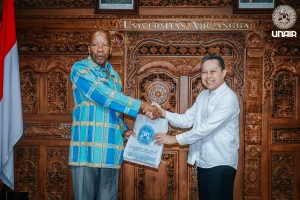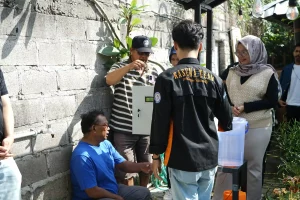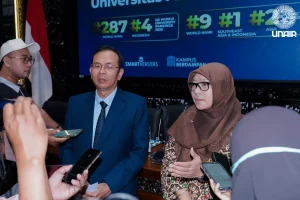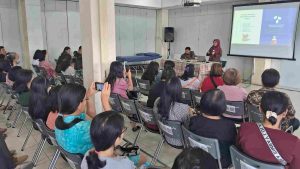UNAIR NEWS – In Indonesia the case of yellow baby or Hiperbilirubinemia was quite high. Data at RSUD Dr. Soetomo Surabaya showed that throughout 2016, the hospital has treated more than 450 babies with hyperbilirubinemia. While 6-8 cases of them experience more severe conditions, called kernicterus.
Hiperbilirubinemia or blood bilirubin levels greater than 5 mg / dl is a clinical symptom that is common in infants aged 1-2 weeks. Although not a rare clinical symptom, the condition still requires attention, as not all jaundice in infants are considered normal.
From the incident, Faculty of Medicine, Universitas Airlangga, through the Department of Pediatrics FK UNAIR-RSUD Dr. Soetomo, the Neonatology Division then took the initiative to develop a paperless registration application.
In collaboration with University Medical Center Groningen the Netherlands (UMCG) for the Indonesian Pediatricians Association (IDAI), the Neonatology Division Team launched an app called Yellow Babies. The launch of the application took place at FK UNAIR Hall on Wednesday, November 22.
Agus Haryanto., dr., Sp.A (K) said that although Hiperbilirubinemia is common in newborns, unfortunately national data about this incident does not yet exist. Therefore, it is important to conduct national data collection for infants with severe hyperbilirubinemia.
“By establishing the register of neonatal Indonesian hyperbilirubinemia, it is hoped that the problem of hyperbilirubinemia in Indonesia can be accurately recorded,” he said.
He added that Yellow Babies application is designed in the form of paperless electronic registers. All health workers can access the application, because it can be downloaded via android or IOS. The application simplifies data collection of hyperbilirubinemia cases handled in the hospital. By entering data real time, then the data from the application is integrated with the system at RSUD Dr. Soetomo.
“We hope that this information system can be well synergized, so that Indonesia’s neonatal health targets will be measured and all existing programs can be assessed for success,” he said.
This program is aimed to reduce morbidity and mortality due to hyperbilirubinemia in newborns. “This is important to support the success of the target of reducing infant mortality rate to 13: 1000 successful births by 2020 in accordance with Sustainable Development Goals (SDGs),” he said.
In addition to launching Yellow Babies application, the Department of Pediatrics FK UNAIR-RSUD Dr. Soetomo also organized the inauguration of visiting professor for Prof. Arend Frederick Bos, MD, PhD from Beatrix Children Hospital University Medical Center Groningen the Netherlands (UMCG).
UMCG is the center for complete guide of hyperbilirubinemia in the Netherlands. No wonder if the Netherlands became one of the hyperbilirubinemia-free countries, especially the complications of kernicterus.
Therefore, FK UNAIR continues to create synergy in research through a clinical approach with the UMCG. “Through international collaboration, hyperbilirubinemia management and treatment in Indonesia is expected to advance. So we can suppress the occurrence of kernicterus in neonatal treatment in Indonesia, “he said.
As a form of appreciation for the collaboration that has existed since 2014, Prof. Mr. Arend was invited as a Visiting Professor of Faculty of Medicine UNAIR who has supervised the Project Plan for Implementing the Management of Hyperbilirubinemia in Resources Contrained Area.
In the event, Prof. Arend came to FK UNAIR accompanied by Prof. Pieter J.J. Sauer, MD, PhD. In front of invited guests, Prof. Arend presented “Improving Health Services by Benchmarking Program Surabaya, Indoneisa-UMCG Groningen, The Netherlands.
Author: Sefya Hayu
Editor: Nuri Hermawan








